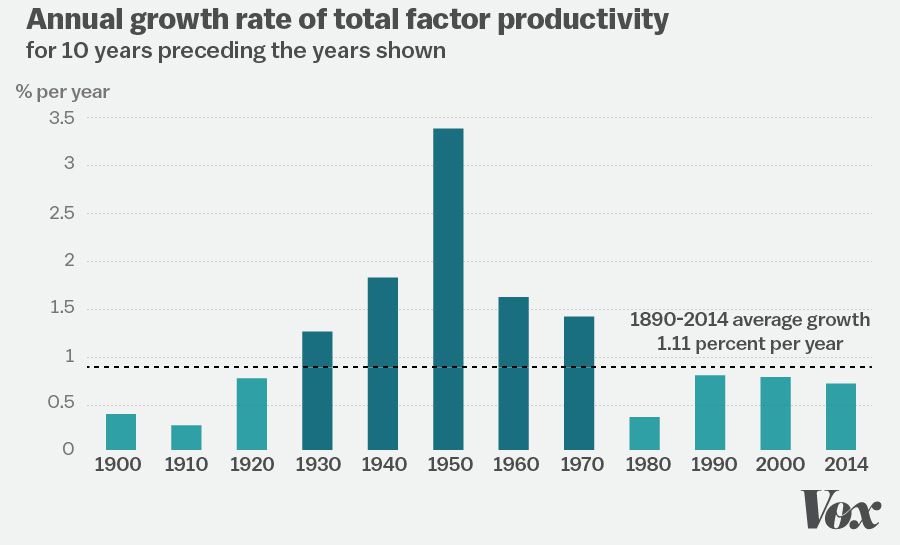Well, I could show you a similar graph regarding bone density. The answer is to fix the issue.
You are using an out of date browser. It may not display this or other websites correctly.
You should upgrade or use an alternative browser.
You should upgrade or use an alternative browser.
[RD] Daily Graphs and Charts
- Thread starter Winner
- Start date
- Status
- Not open for further replies.
JohannaK
Heroically Clueless
what's crystallised intelligence and what is fluid intelligence?
GoodEnoughForMe
n.m.s.s.
Crystal = accumulated knowledge
Liquid = ability to solve new problems
Liquid = ability to solve new problems
JohannaK
Heroically Clueless
Makes sense.
Would be nice to have some idea of what a range between 520 and 480 'means' - do they give the spread of results achieved by those taking the test?
Crystal = accumulated knowledge
Liquid = ability to solve new problems
Does make sense. In many ways scientists, engineers and etc. make their greatest contributions while young, and later only refine that.
OTOH, professions that depend on a lot of accumulated knowledge, such as lawyers (inc. judges and etc) tend to get better with age (up to a point, of course).
They're also averages. One can continue to grow crystallized intelligence by finding important things interesting. As well, one can use accumulated knowledge to investigate techniques that slow the decline of fluid intelligence
Sure, but it's telling that if you look at the Nobel Prizes awarded in the hard sciences categories, the recipients usually did the research that got them the award in their 20's or early 30's (of course they only get the awards much after that, but the actual breakthrough was done at a very young age).
Sadly, the article only has sucky graphs that take a long time to parse. Your intuitions were once true, but have become less true over time.
The graphs mostly support their conclusion, and show the effect much better. But they're the least intuitive graphs I've ever seen, I think.
http://www.pnas.org/content/108/47/18910.fullThus, although the iconic image of the young, great mind making critical breakthroughs was a good description of physics at that time, it turns out to be a poor descriptor of age–creativity patterns more generally or even of physics today, where the mean age of Nobel Prize winning achievements since 1980 is 48 y.
The graphs mostly support their conclusion, and show the effect much better. But they're the least intuitive graphs I've ever seen, I think.
Hum, OK, I stand corrected. I guess the great scientific achievement that we all know and read about were done by young people, but the less glamorous ones that have dominated modern physics seem to be done by older folks. Interesting.
There's also more infrastructure required to do modern experiments, which depends more on status for funding than wild leaps of insight. The odds of Einstein being successful today are much lower.
That said, the number of later achievements from those who were 'early achievers' is going down. Slow and steady can win a lot of races!
That said, the number of later achievements from those who were 'early achievers' is going down. Slow and steady can win a lot of races!
There's also more infrastructure required to do modern experiments, which depends more on status for funding than wild leaps of insight. The odds of Einstein being successful today are much lower.
That said, the number of later achievements from those who were 'early achievers' is going down. Slow and steady can win a lot of races!
There is a more stable parameter, though. I mean if you have human A having height just about half of a wall, then human A will have to try a bit (or think a way to need less trying) to go over that wall. Human B, having twice the original height, will not be dealing with an actual obstacle.
However, crucial point is that this does not really mean that human B is more advanced than human A. It just means that the obstacle is invisible now. Solving is never invisible, though. And losing sight of part of the turning cogs leading to a solution only means you lost part of your own foundation.
You can also look at it from another parallel-cisparallel: if you have more constant speed than the one allowing you to reach point X from your own point, you are faster, yes, but you won't reach that point previously accessible.
GoodEnoughForMe
n.m.s.s.
Oil shock? Dropping the Gold Standard? Running out of low-hanging fruit?
GoodEnoughForMe
n.m.s.s.
Nobody can agree. I got it from this, which is a fantastic read on the future, the economy, and technology http://www.vox.com/a/new-economy-future/technology-productivity
Some people think that the 20th century was a blip of extreme development. Others disagree. Some think we're going to have another revolution when the internet really starts filtering down to everywhere and everything.
You might find the linked article interesting, I really did. It's great water cooler discussion.
Some people think that the 20th century was a blip of extreme development. Others disagree. Some think we're going to have another revolution when the internet really starts filtering down to everywhere and everything.
You might find the linked article interesting, I really did. It's great water cooler discussion.
http://www.cbc.ca/news/technology/so2-pollution-satellite-detection-1.3610537

It's the amount they're cheating by, not their total emissions.

This map shows man-made sources of sulphur dioxide pollution detected by satellite that haven't been reported in global inventories. Many of the biggest sources are in the Persian Gulf and Mexico. (Chris McLinden/Environment and Climate Change Canada)
It's the amount they're cheating by, not their total emissions.
Mise
isle of lucy
Botswana stands out for me. Sup with that?
It is a matter of percentages - if I'm reading it right, they only have one actual site implicated, it just happens to account for all of their production.
SS-18 ICBM
Oscillator

"A map of the subordinate plans of Operation Bodyguard, the 1944 deception in support of the Allied invasion of Normandy (D-Day)."
- Status
- Not open for further replies.
Similar threads
- Poll
- Replies
- 120
- Views
- 8K

